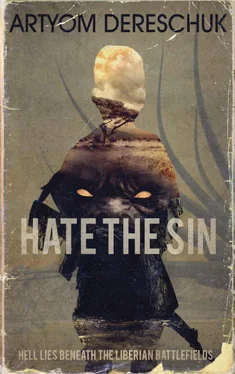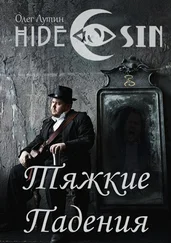Besides, Corpse Eater knew from personal experience that that feeling of hunger was not the worst thing that could happen to them during the war.
The mere outline of his captain’s unkempt hair was making him livid—the captain was the only one who the General allowed to forgo shaving.
Desecrator did not like Tsetse, and he would rather be shot than call him a captain. He didn’t understand what was so special about him that the General liked him so much; the boy did not act like a warrior. He never yelled their battle cries to motivate the others in the battle; he never saw him light up with the righteous anger of revolutionaries. Even the way Tsetse held his rifle seemed unmanly to Desecrator: his index finger only touched the trigger when he was already aiming, as if he was not ready to shoot at a moment’s notice. To Desecrator, such carefulness meant that the captain must’ve been timid. Surely, he had only survived for so long because he was a coward who shied away from the actual combat. Even the name he had chosen was lame—he hadn’t picked a war name that would strike fear into his enemies’ hearts, instead he chose to be called some insect, an infectious fly. And who could forget how the kid had closed his ears and opened his mouth when a grenade landed near them a month ago? Desecrator couldn’t believe how goofy their captain had looked at that moment. So why did everyone fear and respect him?
He had thought many times about ending him with a shot to the back of the head. In the heat of a battle, nobody would even notice where the bullet had come from. Yet for some reason, even aiming at Tsetse’s back seemed like a risk. Desecrator didn’t understand why he couldn’t force himself to do that or what that hesitation meant, and for a long time that indecisiveness tormented him. But eventually he told himself that he would only challenge Tsetse for his title in a fair combat. Soon, when the right moment came.
The village was close, its small wooden huts scattered along the riverbank—no more than two dozen of them. These people did not have that much, but that didn’t matter. Revolution was an important matter that affected everyone, and thus everyone had to contribute to the cause whatever they had. Whether it was their food, home, kids, or lives.
Other kids were cautious when they stepped out of the tall grass, but Desecrator was confident. He was a lion who came out of the prairie to feed on the weak, and his appetite would be sated.
Stepping out of the grass, he raised his assault rifle high into the air with one hand and pulled the trigger. He intended for those shots to be the thunder heralding his arrival. But instead, as soon as the first bullet left its casing, the recoil made his arm jerk down, and the rifle’s heavy and still-warm barrel hit him on the head—not too hard, but hard enough to make him twitch and stagger.
Somebody behind him laughed, and Desecrator swung on his heels, determined to make the arrogant fool pay. But when he turned around the perpetrator had already wiped the smirk from his face. Fifteen faces were staring at him, wondering what he was going to do next.
Tsetse stepped out of the tall grass and, while passing Desecrator, slapped him on the forehead: “Don’t shoot anyone by accident.”
Somebody giggled again, and Desecrator almost boiled with fury; he was being ridiculed in front of everyone—by Tsetse, no less! He wanted to scream, to cuss, but no words were coming out.
He turned around to see Tsetse calmly approach the village, without even minding the other boy. Completely open to his attack. Yet once again, Desecrator found himself unable to act. Something was preventing him from shooting his captain’s exposed back.
His time would come, Desecrator thought to himself, adjusting his rifle. For now, he had plenty of other opportunities to blow off steam.
A whole village of opportunities.
Alarmed by his shot, villagers were exiting their shacks and houses. Some were already running away, but the majority stayed. If they were to run away, they’d leave all of their belongings and food for the taking—and many of them simply couldn’t afford it. Even though the children in front of them were armed, they were still children. In their minds, children could be negotiated with, persuaded to let them be.
Seeing that he had the villagers’ attention, Tsetse raised his AK-47 high into the air—not unlike what Desecrator had done a few moments before.
“We are the soldiers of the Revolutionary Brigade of General Malaria,” he proclaimed. “The General wishes you to assist our cause by donating your food supplies.”
The villagers exchanged confused looks with each other; the General’s brigade had arrived at their region only a few days earlier, so they hadn’t heard the name before.
“Those who shall refuse will be deemed traitors and will be dealt with accordingly,” Tsetse continued, not changing his monotonous pace or tone.
The villagers started to shift around. One of them charged toward the bushes in the distance. Tsetse waved for the other children to advance and, as they approached, the villagers got more and more restless. Some woman started crying.
Tsetse was silently giving his henchmen commands, pointing first to one of the boys and then to one of the huts around them. Everyone understood what he wanted them to do without any words, and the boys started walking toward the houses, one at a time, where the villagers were already waiting for them. Some pleading, other angry, but all of them—scared.
Desecrator decided not to wait until Tsetse personally gave him a command. Choosing a hut that looked like it could have something of value inside, he headed toward it, gripping his gun.
A man in his forties crossed his path, his hands clenched in a universal sign of a plea.
“Please, don’t,” he begged Desecrator. The man’s legs were half bent, and he looked like he could fall to his knees at any moment. “My daughter’s asleep inside. She’s ill and she needs strength. If you take our last food—”
“Step aside, or I’ll shoot!” Desecrator shouted, cocking his gun. Somebody in the village screamed, and the boy felt grim satisfaction melt inside of him: This is how you motivate your troops. Others would undoubtedly follow his example and stop being so reluctant.
On the inside, the boy was hoping that the man would not obey. Give him a reason to shoot him.
“No, please!” The man fell to his knees and raised his hands even higher. The whites of his eyes were round and big as plates, a sharp contrast against his face, which was covered in cold sweat. “I beg you, don’t! Don’t you—”
The bullet punctured the man’s side, going clean through. He cried out and collapsed to the ground, grasping for his wound and curling up into a fetal position. A few more people started screaming, and the demands of the other boys became more agitated.
Stepping over the man, Desecrator headed for the entrance to his hut. Once inside, he started looking around for supplies.
“Daddy?” He heard a female voice coming from the other room. “What’s the commotion outside?”
Desecrator was intrigued: the voice sounded young. Perhaps the girl was even his age?
Pushing the veil that separated two rooms aside, he entered what could only be a bedroom. There was an old closet along the furthest wall, with different self-made trinkets within it, and just near the entrance to the room was one of two beds.
The girl was lying in bed, breathing heavily. She was sweating bullets, and her eyes had bags under them. The boy could tell that it wasn’t because she was scared—she was obviously plagued with some disease.
“Who are you?” she asked in a raspy voice. “Where’s my dad?” She tried to get up, leaning onto her left elbow, and the boy could see how much effort it was costing her.
Читать дальше












